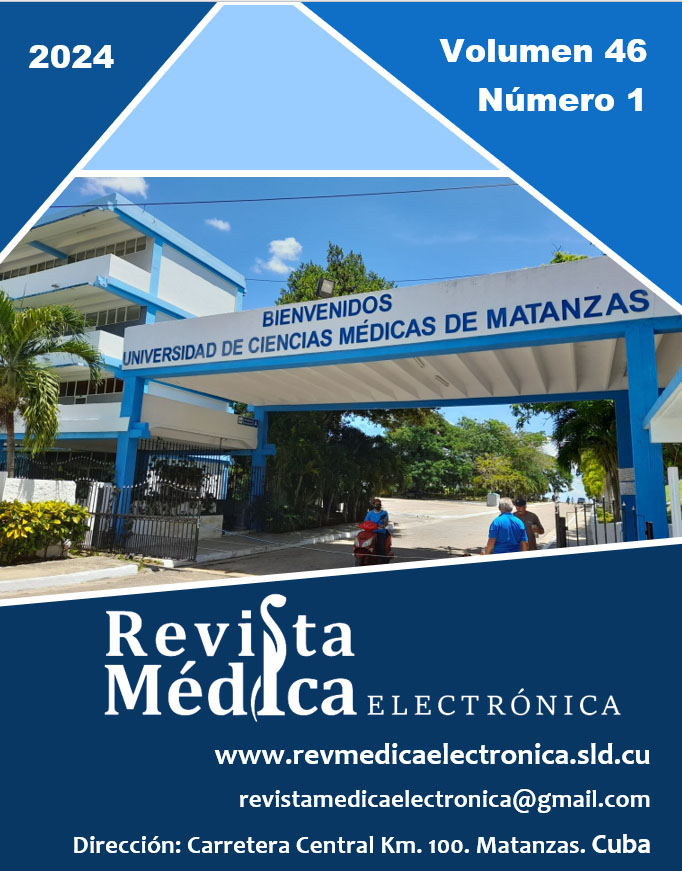La gestión del conocimiento en la formación de los estudiantes de Medicina
Palabras clave:
gestión del conocimiento, educación médica, tecnología digitalResumen
¿Cómo formar con pertinencia y calidad al estudiante de Medicina en el contexto contemporáneo, de modo que posea las herramientas y competencias para aprender por sí y mejorar su desempeño profesional durante su vida? El objetivo de este artículo es valorar la significación de la gestión del conocimiento en la formación de los estudiantes de Medicina. Se exponen ideas básicas para propiciar el debate y la reflexión relacionados con las funciones sustantivas de la universidad, que, a su vez, son vistas como escenarios de formación. Se sistematiza un resultado parcial de carácter teórico de una investigación en curso acerca de la gestión del conocimiento en la formación de los estudiantes de la carrera Medicina Humana, de la Universidad Técnica de Manabí, en la República del Ecuador.
Descargas
Citas
2. IGI Global Publishing House. What is Knowledge Management [Internet]. Hershey, Pensilvania: IGI Global Publishing House; 2008 [citado 14/09/2023]. Disponible en: https://www.igi-global.com/dictionary/knowledge-transfermarketing-second-life/16367
3. Toledo Santana N, Marín Pérez AL, Marín Toledo I, et al. La gestión del conocimiento: prioridad de la formación médica en el siglo XXI. Atenas [Internet]. 2023 [citado 28/07/2023];(61):1-14. Disponible en: http://atenas.umcc.cu/index.php/atenas/article/view/641/1041
4. Koenig ME. What is KM? Knowledge Management Explained. KMWorld [Internet]. Camden, ME: KMWorld; 2012 [citado 30/07/2020]. Disponible en: https://www.kmworld.com/Articles/Editorial/What-Is-.../What-is-KM-Knowledge-Management-Explained-82405.aspx
5. Varona Domínguez F. La formación universitaria integradora y activa: características básicas. Rev Cubana Educ Super [Internet]. 2021 [citado 22/07/2022];40(2). Disponible en: http://scielo.sld.cu/scielo.php?script=sci_arttext&pid=S0257-43142021000200003
6. Lin CY, Huang CK, Zhang H. Enhancing Employee Job satisfaction via E-learning: The Mediating Role of an Organizational Learning Culture. Int J Hum Comput Interact. 2018;35(7):584-95. DOI: 10.1080/10447318.2018.1480694.
7. Hujala T, Laihonen H. Effects of knowledge management on the management of health and social care: a systematic literature review. J Knowl Manag. 2021;25(11):203-21. DOI: 10.1108/JKM-11-2020-0813.
8. Ferguson R. Ethical Challenges for Learning Analytics. J Learn Anal [Internet]. 2019;6(3):25-30. DOI: 10.18608/jla.2019.63.5.
9. Ferguson R, Clow D, Griffiths D, et al. Moving Forward with Learning Analytics: Expert Views. J Learn Anal. 2019;6(3):43-59. DOI: 10.18608/jla.2019.63.8.
10. Ruipérez-Valiente JA. El Proceso de Implementación de Analíticas de Aprendizaje. RIED. 2020;23(2):85-101. DOI: 10.5944/ried.23.2.26283.
11. Rodríguez-Montoya C, Zerpa-García CE. Gestión del Conocimiento en Programas de Postgrado. Un Modelo Prescriptivo. Pixel-Bit [Internet]. 2019 [citado 05/07/2022];(55):179-209. Disponible en: https://dialnet.unirioja.es/servlet/articulo?codigo=6901358
12. Vidal-Ledo MJ, Madruga-González A, Valdés-Santiago D. Inteligencia artificial en la docencia médica. Educ Méd Super [Internet]. 2019 [citado 05/07/2022];33(3). Disponible en: https://ems.sld.cu/index.php/ems/article/view/1970
13. Cruz-Ardila JC, Olarte-Cabana JA, Hernández-Vásquez S, et al. La investigación formativa en Colombia: Una mirada desde su implementación. Bol Redipe. 2022;11(2):177-87. DOI: 10.36260/rbr.v11i2.1676.
14. Espinoza-Freire EE. La investigación formativa. Una reflexión teórica. Conrado [Internet]. 2020 [citado 09/09/2021];16(74):45-53. Disponible en: http://scielo.sld.cu/scielo.php?script=sci_arttext&pid=S1990-86442020000300045
15. Pineda-Vélez EL, Botero-Mariaca PM.La investigación formativa como elemento fundamental de la formación de Odontólogos. Franz Tamayo [Internet]. 2023 [citado 05/07/2023];5(12):67-81. Disponible en: https://revistafranztamayo.org/index.php/franztamayo/article/view/1016/2247
Publicado
Cómo citar
Número
Sección
Licencia
La misma permite:
• Copiar y redistribuir el material publicado en cualquier medio o formato.
• Adaptar el contenido.
Esto se realizará bajo los siguientes términos:
• Atribuir los créditos de los autores e indicar si se realizaron cambios, en cuyo caso debe ser de forma razonable.
• Uso no comercial.
• Reconocer la revista donde se publica.
Se mantienen los derechos de autoría de cada artículo, sin restricciones.






